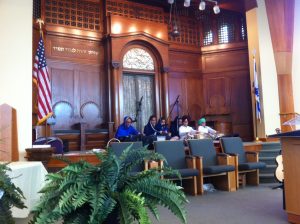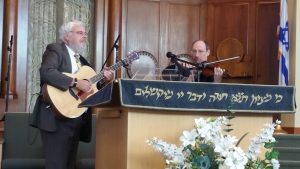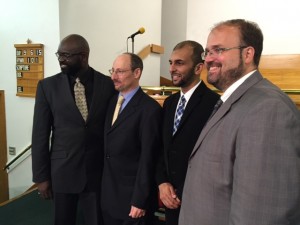By Rabbi Carl Choper; President of The Interfaith Alliance of Pennsylvania
Sometime this past summer I heard a report on National Public Radio of an interaction on the floor of the U.S. House of Representatives that serves to illustrate the clash of social values underlying the current paralysis in the United States government.
One U.S. representative, a Democrat, rose and spoke in favor of funding social programs that feed the hungry on the grounds that, as a Christian, he held to certain Biblical texts in which Jesus says that “as you do to the least of these, so you do to me.” This, the representative said, includes feeding the hungry, and is why he feels it is immoral for the government to defund programs designed to make sure that even the poorest among us – which includes a lot of children – have food to eat. Following this, a second U.S. representative, a Republican, rose and adamantly identified himself as a Christian as well, and said that he also held by the same Biblical texts. But he argued that this moral imperative to feed the hungry applied only to individuals who voluntarily feed the hungry as an act of charity. It was not the role of government to feed the hungry, and nor did those Christian moral principles instructing us to feed the hungry apply to the government.
To me this interaction is quite clarifying for understanding why the U.S. government at this moment is in the midst of a partial (but very real) shutdown. Both sides in the standoff believe in responsibility, but one side believes only in individual responsibility. (This despite the fact that we have a legal system that recognizes corporations as legal persons with all the rights. but few if any of the responsibilities, of individual people.) The other side believes both in individual responsibility and communal responsibility, with government acting as an agent of the people in fulfilling that communal responsibility.
One side believes that government is a problem whose role must be minimized. Other than limited functions like protecting our borders there is not much more government should be doing. This is why this side is so opposed to expanded governmental involvement in healthcare (with the hypocritical exception that many on the same side seem to fight for a larger governmental presence in the bedroom and in women’s health clinics). This is why they oppose governmental regulation of the marketplace, in which individual actions are supposed to add up for the benefit of all responsible individuals. This is why we see efforts to defund public schools in favor of privately run charter schools. This is why we hear proposals to privatize the funding, operation and perhaps even ownership of roads; and suggestions that national parks should be owned and operated by private, non-profit organizations. Most particularly, the argument against any form of gun regulation is so that armed individuals can protect themselves from the government itself, which in their view is always impinging on the rights of individuals.
The belief that we should have little to no government is also why the real need to balance the federal budget is being used to further the goal of dismantling government. The reason for insisting that the budget be balanced without any tax increases, but only through spending cuts – preferably on programs that help sustain the elderly, single mothers with children, the disabled and the poor – is because they do not believe government should be used to supplant individual responsibility with a form of communal responsibility. Indeed, instituting any government program in order to meet any form of communal responsibility in this view is really a form of socialism.
This is also why radicals in the House of Representatives were not afraid of the sequester in government spending that took hold earlier this year. In fact, the sequester was likely a positive thing in their view because it reduced the size of government. This is also why not everyone is upset that part of the federal government has been shut down. The current partial shutdown aids these radicals in forcing a downsize of government, especially in that it distinguishes between “essential” and “non-essential ” parts of government. By this argument, any aspects of government that are non-essential ought not exist anyway. The next logical step would be for radicals in the House of Representatives to indicate piece by piece what forms of government should be funded, and which should simply be allowed to fade away. This is precisely what radical members of the House are now proposing.
All these efforts make moral sense if you do not believe that the government plays an important role in our society’s effort to fulfill communal responsibilities, such as making sure that the most vulnerable of our people are not dying in our streets homeless, sick and hungry. But to those who think that government is somehow an expression of the people, and is therefore a powerful tool for us all to fulfill certain aspects of communal responsibility, the wholesale dismantlement of government has the seeds of a moral catastrophe. As a practical matter, there are certain functions which are very difficult for private and poorly-funded, volunteer, non-profit organizations to fulfill. As a society, we discovered this during the Great Depression when unregulated economic practices destroyed the economy and people literally were going hungry in our streets. The major social difference between the Depression of 1929 and the Recession of 2008 is that in 2008 there was in place some semblance of a government-run safety net. That safety-net was part of the twentieth-century expansion of government that the radicals in the House now want to undo.
We need to understand that these radicals have a very harsh view of what society is supposed to be, with a very limited view of what constitutes social responsibility, and that the campaign to institute that view is already well underway.



